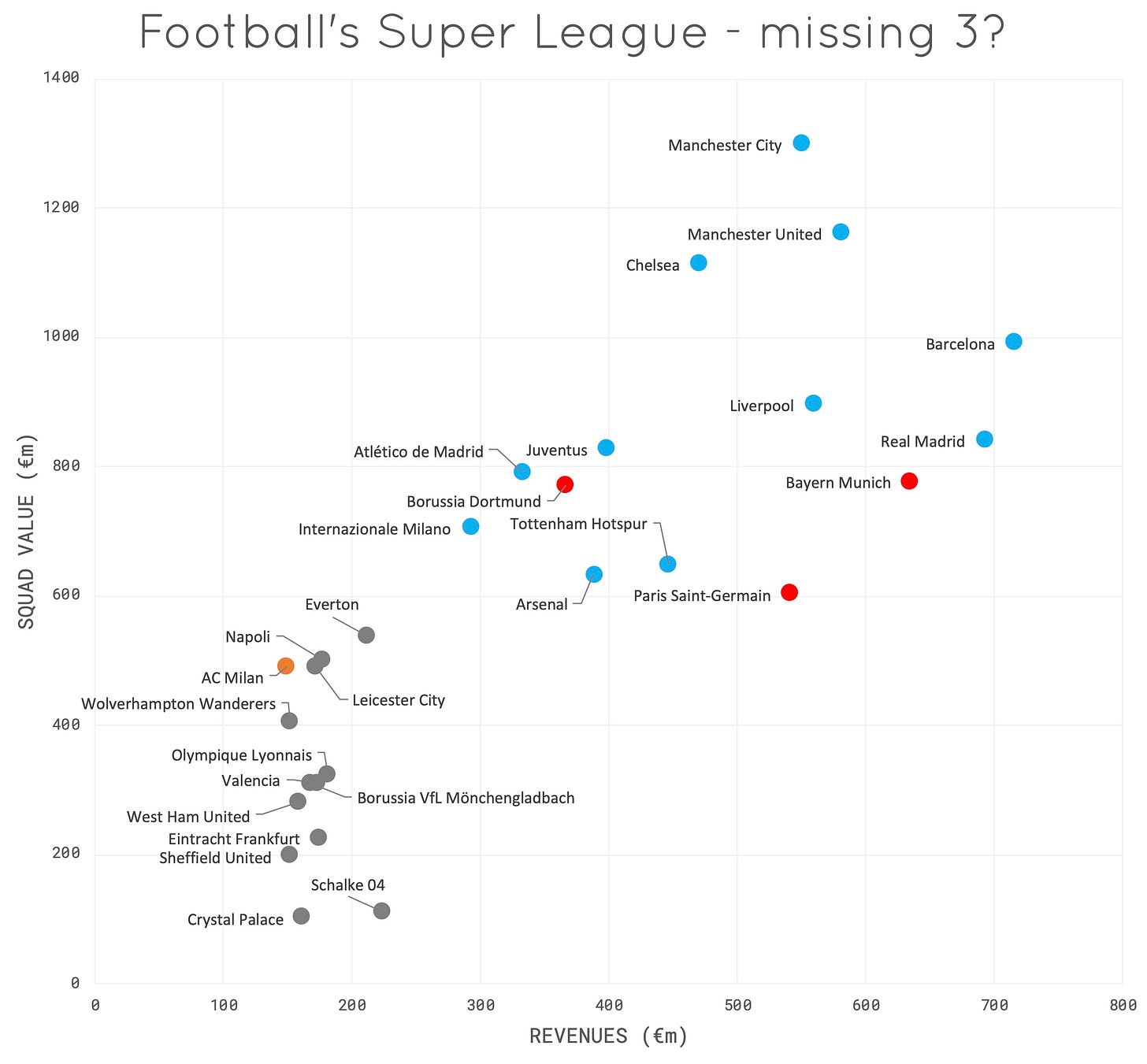The European football 'Super League' - why it's probably dead on arrival
As with everything in Europe, it's all to do with France and Germany.
The announcement of a European Super League is one of those stories where you feel like you've heard it all before. And you have. It's been hinted at for years. I won't trouble you with all the links to that coverage. But here's a good summary.
The driver is of course money - this is top level football after all. But does it make economic sense?
It all hinges on France and Germany. And it doesn't look good.
The Super League (SL) is to be 15 clubs, with five extras drawn from somewhere according to domestic league criteria.
So far, 12 have declared. They are:
Barcelona
Real Madrid
Manchester United
Liverpool
Manchester City
Chelsea
Tottenham Hotspur
Juventus
Arsenal
Atlético de Madrid
Internazionale Milano
AC Milan
And, according to the latest research from Deloitte, the top 14 clubs by revenue in the world are:
Barcelona
Real Madrid
Bayern Munich
Manchester United
Liverpool
Manchester City
Paris Saint-Germain
Chelsea
Tottenham Hotspur
Juventus
Arsenal
Borussia Dortmund
Atlético de Madrid
Internazionale Milano
Look familiar?
Of the 12 clubs announced, 11 are in that top 14.
Who is missing? Well, the the notable outlier from this list is AC Milan - a club that has been banned from UEFA competitions and is now ranked 30th in the world in revenue (below less heralded Sheffield United and Wolverhampton Wanderers). AC Milan are, I suppose, a special case - European royalty in terms of titles and reputation, even if recently tarnished. However, the club's inclusion doesn't make financial sense particularly. The club certainly has strong ties to TV rights, but it's not a big hitter otherwise.
So if and when the SL announces the next three members, you'd imagine that Bayern, PSG and Dortmund would be the ones - but the hints have been that those clubs were not so keen to sign up. Whether it's their supporter-owned structure in the case of German clubs, or domestic pressure, or settling for domestic security and a regular tilt at the existing Champion’s League, for whatever reason they aren't in the initial group, and that's a huge problem.
In fact, the SL's announcement without those three clubs looks a bit shaky, before all the pressure that's coming from domestic leagues, administrators and even politicians. The chart below shows how the top 14 stack up in terms of revenue (via Deloitte) and squad value (via CEIS). [Revenue shows how they are already an attractive financial prospect, and squad value gives you a sense of the appeal of their players.]
You can see the grouping towards the top right. AC Milan are the orange dot - outside the bigger clubs. Those red dots are the three that the SL desperately needs.
Why? Well, without those three, a 20 team league divided into two groups of ten means each team in the SL gets guaranteed 18 matches. Selling 18 PSG or Bayern home and away games vs top quality teams is fine. But if those three of Bayern, Dortmund and PSG don't play, who's next?
Defining "big" clubs is hard, but let's break it down. There's revenue, brand, or history.
Next in the revenue rankings are Zenit (of Russia), Schalke 04 (Germany), Everton (England), Olympique Lyonnais (France) and Napoli (Italy). If French and German clubs are out of the picture, you're then move to Leicester and Valencia. Not quite the line up the Super League intended, I'd imagine.
If you were to find other clubs according to brand value (according to Brand Finance) after the 12 that have signed up and excluding the three of Bayern, Dortmund and PSG, the next in line would be Leipzig, Leicester, Schalke, Everton, Wolves and Newcastle. Same thing. No offence, but I don't think 18 Schalke or 18 Wolves fixtures would be the type of glamour matches the SL had in mind.
So the SL could look outside the big-5 leagues of England, Italy, Spain, France and Germany - perhaps to include clubs like Ajax or Porto, given their European pedigree. However, given the extraordinary backlash from the bigger leagues of England and others, it would just make more problems, more possible legal challenges, and more headaches.
Also from a financial perspective, it's less obvious - according to Deloitte research, Zenit of Russia is the only club from outside the big-5 in the top 30 by revenue.
It is the same problem if you consider where the five qualifiers will come from. Again, if it's a way to get the likes of Ajax or Porto, Celtic or Galatasaray in, the legal problems will arise. If it's to get in more clubs from England, Spain and Italy, the SL will lack diversity and appeal.
So the SL is basically in a bind. If Bayern, Dortmund and PSG don't join, the league either risks scraping the barrel in terms of clubs from England, Italy and Spain; finding clubs from other leagues (tricky and more legal challenges), or the unthinkable idea of cutting back from 20 and being a smaller league of 12 or 15 (a massive U-turn).
Not so super, perhaps?



